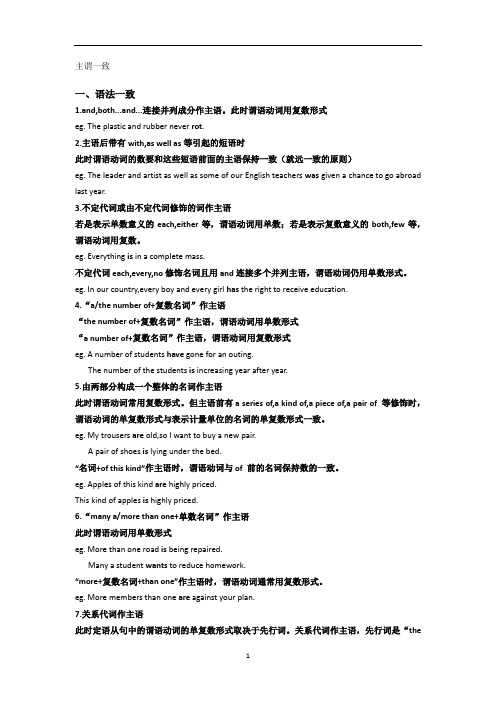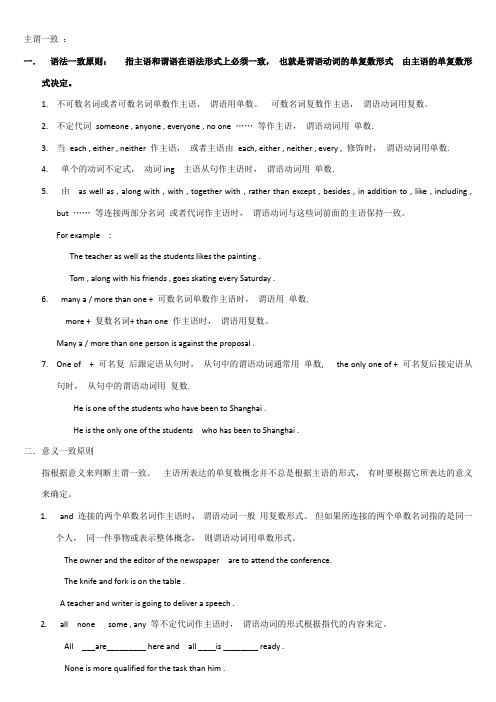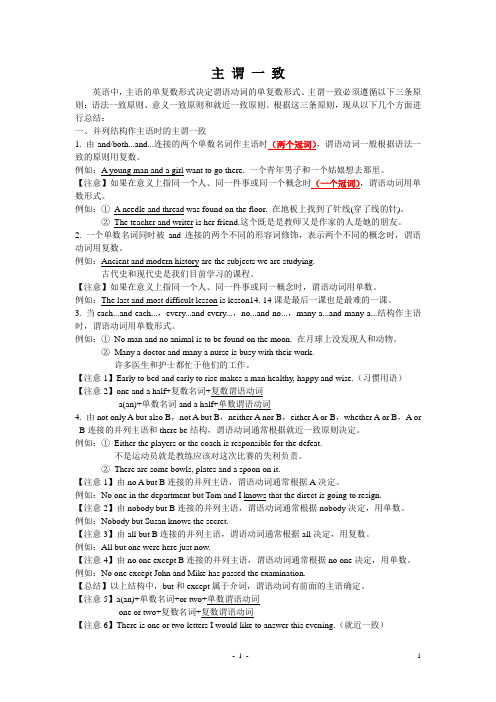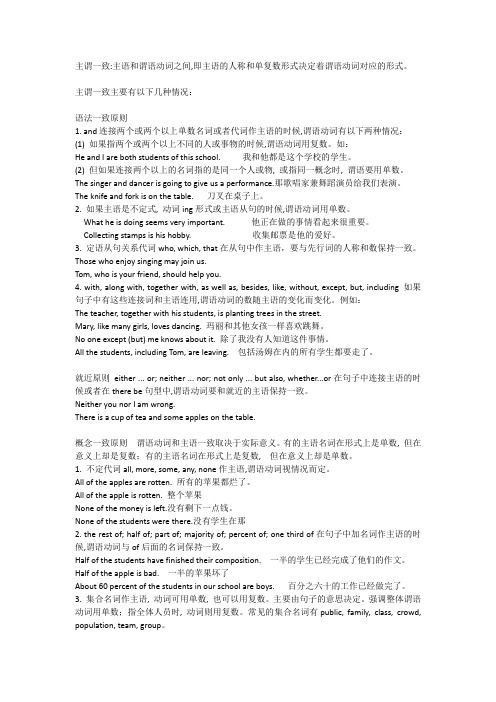不定代词作主语的主谓一致归纳
不定代词的使用和辨析

不定代词的使用和辨析不定代词是指不具体指明代替的人或物的代词,它在句子中起到代替名词或指示词的作用。
它的使用对于句子的连贯性和表达的准确性至关重要。
本文将探讨不定代词的使用和辨析。
一、不定代词的基本概念不定代词是一种特殊的代词,它具有指示、代替和数量表达的功能。
不定代词可以统指不确定的人或物,常用于句子中指代未具体指出的事物。
二、不定代词的分类及用法1. 不定代词的分类(1)不定代词的基本形式:something, anything, nothing, everything 等。
(2)不定代词的否定形式:nobody, no one, none, neither等。
(3)不定代词的指示形式:this, that, these, those等。
2. 不定代词的用法(1)不定代词作主语:Everyone is responsible for their own actions.(每个人对自己的行为负责。
)(2)不定代词作宾语:I want something to eat.(我想要吃点东西。
)(3)不定代词作表语:The problem is nothing.(问题并不存在。
)(4)不定代词作定语:Any book will do.(任何一本书都可以。
)三、常见不定代词的辨析1. somebody, anybody, nobody(1)somebody:某人,用于肯定句,表示未具体指明的人。
(2)anybody:任何人,用于疑问句和否定句,表示任何不确定的人。
(3)nobody:没有人,表示全部人都不。
2. something, anything, nothing(1)something:某事物,用于肯定句,表示未具体指明的事物。
(2)anything:任何事物,用于疑问句和否定句,表示任何不确定的事物。
(3)nothing:没有事物,表示全部事物都没有。
3. somewhere, anywhere, nowhere(1)somewhere:某地,用于肯定句,表示未具体指明的地点。
every 主谓一致的用法

every 主谓一致的用法主谓一致是语法中的一个重要概念,它要求句子中的主语与动词在人称和数上保持一致。
正确使用主谓一致可以帮助我们表达清晰准确的意思,避免产生歧义。
本文将详细介绍主谓一致的用法,并给出一些例子来帮助读者更好地理解。
一、基础概念在英语语法中,主谓一致指的是句子中的主语与动词在人称和数上保持一致。
换句话说,如果主语是单数形式,则相应的动词也需要用单数形式;如果主语是复数形式,则相应的动词也需要用复数形式。
这样做可以使句子更加通顺自然,避免产生混淆或误解。
二、特殊情况1. 复合主语:当句子中有两个或多个并列的主语时,我们需要确保与之匹配的动词适应复合主题中最接近它的名词。
例如:The dog and the cat are playing in the garden.狗和猫正在花园里玩耍。
2. 不定代词作为主语:有些不定代词(如everyone、someone、nobody等)看似复数形式,但在使用时需要用单数形式的动词。
例如:Everyone knows the answer to this question.每个人都知道这个问题的答案。
3. 跟随介词短语的主语:当主语位于介词短语后面时,在决定动词形式时,应根据主语而不是介词短语的成员来确定。
例如:The girl with glasses is reading a book.戴眼镜的女孩正在读书。
三、一致性错误1. 主谓不一致:错误示例:The dog play in the garden.正确示例:The dog plays in the garden.解析:动词play与主题dog不一致。
应该用plays。
2. 不定代词错误:错误示例:Everyone have their own opinions.正确示例:Everyone has their own opinions.解析:动词have与不定代词everyone不一致。
高中英语 高考语法 主谓一致 规则梳理

主谓一致一、语法一致1.and,both...and...连接并列成分作主语。
此时谓语动词用复数形式eg. The plastic and rubber never rot.2.主语后带有with,as well as等引起的短语时此时谓语动词的数要和这些短语前面的主语保持一致(就远一致的原则)eg. The leader and artist as well as some of our English teachers was given a chance to go abroad last year.3.不定代词或由不定代词修饰的词作主语若是表示单数意义的each,either等,谓语动词用单数;若是表示复数意义的both,few等,谓语动词用复数。
eg. Everything is in a complete mass.不定代词each,every,no修饰名词且用and连接多个并列主语,谓语动词仍用单数形式。
eg. In our country,every boy and every girl has the right to receive education.4.“a/the number of+复数名词”作主语“the number of+复数名词”作主语,谓语动词用单数形式“a number of+复数名词”作主语,谓语动词用复数形式eg. A number of students have gone for an outing.The number of the students is increasing year after year.5.由两部分构成一个整体的名词作主语此时谓语动词常用复数形式。
但主语前有a series of,a kind of,a piece of,a pair of 等修饰时,谓语动词的单复数形式与表示计量单位的名词的单复数形式一致。
eg. My trousers are old,so I want to buy a new pair.A pair of shoes is lying under the bed.“名词+of this kind”作主语时,谓语动词与of 前的名词保持数的一致。
高中英语主谓一致讲解

主谓一致:一.语法一致原则:指主语和谓语在语法形式上必须一致,也就是谓语动词的单复数形式由主语的单复数形式决定。
1.不可数名词或者可数名词单数作主语,谓语用单数。
可数名词复数作主语,谓语动词用复数。
2.不定代词someone , anyone , everyone , no one ……等作主语,谓语动词用单数.3.当each , either , neither 作主语,或者主语由each, either , neither , every , 修饰时,谓语动词用单数.4.单个的动词不定式,动词ing 主语从句作主语时,谓语动词用单数.5.由as well as , along with , with , together with , rather than except , besides , in addition to , like , including ,but ……等连接两部分名词或者代词作主语时,谓语动词与这些词前面的主语保持一致。
For example :The teacher as well as the students likes the painting .Tom , along with his friends , goes skating every Saturday .6.many a / more than one + 可数名词单数作主语时,谓语用单数.more + 复数名词+ than one 作主语时,谓语用复数。
Many a / more than one person is against the proposal .7.One of + 可名复后跟定语从句时,从句中的谓语动词通常用单数, the only one of + 可名复后接定语从句时,从句中的谓语动词用复数.He is one of the students who have been to Shanghai .He is the only one of the students who has been to Shanghai .二.意义一致原则指根据意义来判断主谓一致。
主谓一致英语语法详细讲解

主谓一致英语中,主语的单复数形式决定谓语动词的单复数形式。
主谓一致必须遵循以下三条原则:语法一致原则、意义一致原则和就近一致原则。
根据这三条原则,现从以下几个方面进行总结:一、并列结构作主语时的主谓一致1. 由and/both...and...连接的两个单数名词作主语时(两个冠词),谓语动词一般根据语法一致的原则用复数。
例如:A young man and a girl want to go there. 一个青年男子和一个姑娘想去那里。
【注意】如果在意义上指同一个人、同一件事或同一个概念时(一个冠词),谓语动词用单数形式。
例如:①A needle and thread was found on the floor. 在地板上找到了针线(穿了线的针)。
②The teacher and writer is her friend.这个既是是教师又是作家的人是她的朋友。
2. 一个单数名词同时被and连接的两个不同的形容词修饰,表示两个不同的概念时,谓语动词用复数。
例如:Ancient and modern history are the subjects we are studying.古代史和现代史是我们目前学习的课程。
【注意】如果在意义上指同一个人、同一件事或同一概念时,谓语动词用单数。
例如:The last and most difficult lesson is lesson14. 14课是最后一课也是最难的一课。
3. 当each...and each...,every...and every...,no...and no...,many a...and many a...结构作主语时,谓语动词用单数形式。
例如:①No man and no animal is to be found on the moon. 在月球上没发现人和动物。
②Many a doctor and many a nurse is busy with their work.许多医生和护士都忙于他们的工作。
不定代词的主谓一致原则

顾名思义,不定代词不指定具体的人、物或数量。
大部分不定代词不是指示单数就是指示复数,但是有些不定代词既可以指示单数,也可指示复数。
单数不定代词使用单数动词,相应的任何人称代词在数量或性别上也应该一致,复数不定代词也一样。
一、常见的指代单数的不定代词1. another 再一;另一(事物或人)That ice-cream was good. Can I have another?那冰淇淋很好吃。
我能再来一杯吗?解析:another 还可以作形容词,例如:I'd like another drink, please.请给我再来一杯。
2. anybody/anyone 任何人Can anyone answer this question?有人能回答这个问题吗?3. anything 任何东西,任何事物The doctor needs to know if you have eaten anything in the last two hours.医生需要知道你在过去两个小时里有没有吃过东西。
4. each 每个人Each has his own thoughts.每个人都有自己的想法。
5. either (两者中的)任何一个Do you want tea or coffee?你要茶还是咖啡?I don't mind. Either is good for me.我不介意。
任何一个都可以。
6. enough 足够,充分,充足Enough is enough.适可而止。
解析:第一个enough 是不定代词作主语,第二个enough 是形容词作表语。
7. everybody/everyone 每人,人人,所有人We can start the meeting because everybody has arrived.我们可以开始开会了,因为大家都到了。
8. everything 所有事物,一切They have no house or possessions. They lost everything in the earthquake.他们没有房子和财产。
主谓一致用法归纳

主谓一致用法归纳:1.不定代词another,anyone,anybody,anything,each,everyone,everybody,everything,one,someone,somebody,something等作主语时,谓语动词通常用单数。
例如:Anyone who wants to come is welcome.谁愿来都欢迎。
Was there anything about him in the newspaper?报纸中有关于他的消息吗?Each of these things has a different weight.这些东西的重量是各不相同的。
Everyone has his hobby.各有嗜好。
Everybody is doing his best.各尽所能。
Nobody has time for such things.没有人有时间干这些事。
Someone calls you.有人叫你。
Something is wrong with my watch.我的表出毛病了。
2.表示否定的不定代词no one,nobody,nothing作主语时,谓语动词通常用单数。
例如:No one knows where he is.没人知道他在哪里。
Nobody likes earthquakes.谁也不喜欢地震。
Nothing in the world is difficult for one who sets his mind to do.天下无难事,只怕有心人。
但none作主语时,谓语动词既可用单数,也可用复数。
例如:None have(has)arrived yet.3.all,most,some等不定代词作主语时,如指的是复数概念,谓语动词用复数,如指的是单数概念,谓语动词用单数。
例如:All are happy to hear the news.大家听到这个消息都很高兴。
不定代词作主语时的主谓一致问题

创作编号:GB8878185555334563BT9125XW创作者:凤呜大王*不定代词作主语时的主谓一致问题1. someone, anyone等作主语时someone, anyone, no one, everyone, something, nothing等复合不定代词作主语,谓语动词用单数:Someone is asking to see you. 有人找你。
Nobody is to blame for it. 这谁也不怨。
No one wants to read such books. 没有人想看那样的书。
2. all 作主语时若指人,谓语通常用复数;若指事物或现象,谓语通常用单数:All have gone home. 大家都走了。
All that glitters is not gold. 发亮的不一定都是金子。
比较:All is silent. 万籁俱寂。
(指现象)All are silent. 人人都沉默不语。
(指具体的人)【注意】若是“all of+名词”作主语,则谓语动词与其中名词的数保持一致。
3. either和neither作主语时若是单独作主语,谓语通常用单数:Neither was satisfactory. 两个都不令人满意。
The two guests have arrived, and either is welcome. 两位客人都到了,哪一位都受欢迎。
【注意】若是“either [neither] of+名词”作主语,则其后的谓语动词可用单数(正式文体)或复数(非正式文体):Neither of the two computers is [are] cheap. 这两台电脑都不便宜。
Is [Are] either of the boys ready? 两个男孩都准备好了吗?I don’t think either of them is [are] at home. 我想他们俩个都会不在家。
英语主谓一致重点知识归纳

英语主谓一致重点知识归纳英语主谓一致重点知识归纳主谓一致的三个原则1. 语法一致原则该原则要求谓语动词必须与主语在语法形式上保持一致,即主语是单数形式,动词用单数形式,主语是复数形式,动词用复数形式:Both my parents are doctors. 我的父母都是医生。
The living-room walls are a light yellow. 客厅的墙是淡黄色。
The two factories are in the same locality. 两家工厂都在同一个地区。
Her job is teaching French. 她的工作是教法语。
The location of the house is near the highway. 房子的地点靠近公路。
A large amount of damage was done in a short time. 短期内造成大量损害。
2. 意义一致原则有时候谓语动词的数取决于主语所表示的概念,而不是其语法形式:This news is important for us. 这条消息对我们很重要。
Paris is among the largest cities in the would. 巴黎是世界上最大的城市之一。
The thesis was about a hundred and fifty pages long. 论文有一百五十页长。
Watch out! The police are coming. 当心,警察来了。
Less people are going to university than usual. 现在上大学的人比平时少。
3. 就近原则有时,谓语动词的数决定于主语中最靠近它的词语:Either you or I am wrong. 不是你错了就是我错了。
Neither the students nor theteacher is interested in it. 老师和学生对此都不感兴趣。
主谓一致总结

主谓一致:主语和谓语动词之间,即主语的人称和单复数形式决定着谓语动词对应的形式。
主谓一致主要有以下几种情况:语法一致原则1. and连接两个或两个以上单数名词或者代词作主语的时候,谓语动词有以下两种情况:(1) 如果指两个或两个以上不同的人或事物的时候,谓语动词用复数。
如:He and I are both students of this school. 我和他都是这个学校的学生。
(2) 但如果连接两个以上的名词指的是同一个人或物, 或指同一概念时, 谓语要用单数。
The singer and dancer is going to give us a performance.那歌唱家兼舞蹈演员给我们表演。
The knife and fork is on the table. 刀叉在桌子上。
2. 如果主语是不定式, 动词ing形式或主语从句的时候,谓语动词用单数。
What he is doing seems very important. 他正在做的事情看起来很重要。
Collecting stamps is his hobby. 收集邮票是他的爱好。
3. 定语从句关系代词who, which, that在从句中作主语,要与先行词的人称和数保持一致。
Those who enjoy singing may join us.Tom, who is your friend, should help you.4. with, along with, together with, as well as, besides, like, without, except, but, including 如果句子中有这些连接词和主语连用,谓语动词的数随主语的变化而变化。
例如:The teacher, together with his students, is planting trees in the street.Mary, like many girls, loves dancing. 玛丽和其他女孩一样喜欢跳舞。
高中英语知识点归纳主谓一致的特殊情况

高中英语知识点归纳主谓一致的特殊情况主谓一致是英语语法中的一个重要概念,指的是主语与谓语在人称和数上保持一致。
一般情况下,我们可以根据主语的单复数形式来确定谓语动词的形式。
然而,在某些特殊情况下,主语与谓语之间的一致并不完全按照常规规则进行。
本文将介绍高中英语中主谓一致的特殊情况,并提供相关实例。
一、不定代词作主语当不定代词作主语时,谓语动词要与其所指的名词保持一致。
常见的不定代词有:each, every, either, neither, everyone, everybody, everything, somebody, something等。
例1:Every student in the class has to submit their homework on time.例2:Someone left their bag in the hallway.二、集体名词作主语集体名词指的是由多个成员组成的群体,如team, class, group, family等。
当集体名词作主语时,谓语动词的单复数形式可以根据语境来决定,通常情况下,使用单数形式。
例1:The football team is practicing for the upcoming match.例2:My family enjoys going on vacations together.三、there be句型中的主谓一致在there be句型中,主语并不位于句首,而是由be动词后的名词或代词来充当。
谓语动词的形式要与主语所指的人或事物保持一致。
例1:There is a book on the table.例2:There are many students in the classroom.四、连接词引起的主谓一致当主语由连接词“either...or”, “neither...nor”或“not only...but also”引起时,谓语动词要与连接词后面的名词保持一致。
主谓一致用法归纳

主谓一致用法归纳主谓一致用法归纳在英语中,句子的主语和谓语在人称和数上必须做到一致。
下面是主谓一致的一些主要规则:1、单词本身以-s结尾的某些名词作主语时,主谓一致的关系如下:1)学科名称:以-s结尾的科学名词如physics ,mathematics (maths) ,politics, ecn\onomics(经济学)等作主语时,如果看作一门学科,谓语动词用单数,如果不是指一门学科,而是指其它含义,谓语动词可用复数。
如:Politics is taught in our school.Economics is an important subject. 经济学是一门重要的学科。
但在以下句子中应使用得数谓语。
如:His mathematics are weak..他的数学能力弱。
2)某些专有名词:以- s结尾的某些专有名词如the United States ,the United Nations 等作主语时,谓语动词用单数。
如:The United states is in North America.3)以-s结尾的词如news, means , works 等词作主语时,谓语用单数,但如果means,works 指复数意义时,谓语用复数。
如:A chemical works is being built now.Two chemical works have been built in my hometown.4) 由成双,成双部分构成的器具及衣物等作主语时,谓语用复数。
若前边有a pair of …或a suit of …等词来修饰时,谓语动词用单数。
如:The clothes were made by herself.常见这样的词有:trousers, glasses, scissors (剪刀),tongs (钳子)等。
2、用and连接的两个名词作主语:1)用and 并列两个单数名词,构成复数主语时,谓语动词用复数。
2020中考英语主谓一致和倒装句知识点总汇

中考英语之主谓一致和倒装句1. and和both---and---连接两个主语时,谓语用复数。
例:Both Lucy and Lily are students. Lily和Lucy两个都是学生。
2.不定代词either/ each/ every 和复合不定代词作主语时,谓语用单数。
neither和none作主语时,谓语用单数复数都可以。
例:Each boy has a new book. 每个孩子都有一本新书。
There is something wrong with your bike. 你的自行车有毛病。
3. 就前一致主语后接有with, along with, together with, except, but 连接另一个主语时,谓语动词与最前面的主语保持一致。
例:Mr Green with his wife is coming to Beijing. 格林先生和他的妻子一起将来北京。
No one but I knows the thing. 除了我,没有人知道那件事。
All except Harry have passed the driving test. 除了Harry,所有人都通过了驾驶考试。
3.就近一致either---or---或者,或者neither---nor--- 两者都不, not only--- but also---不但---,而且---, not---but---, 不是---,而是---,or 或者以上这些词连接两个主语时,谓语动词与最近的主语保持一致。
例:Neither her sister nor Mary is going to the park tomorrow. (is和最近的主语Mary保持一致)Not only my parents but also I am interested in sports. (am和最近的主语I 保持一致)4 集体名词family, team, class, group crowd, company, government作主语时,如果表示整体,谓语动词用单数;如果表示个体成员,谓语动词用复数。
不定代词作主语时的主谓一致问题

不定代词作主语时的主谓一致问题1. someone, anyone等作主语时someone, anyone, no one, everyone, something, nothing等复合不定代词作主语,谓语动词用单数:Someone is asking to see you. 有人找你。
Nobody is to blame for it. 这谁也不怨。
No one wants to read such books. 没有人想看那样的书。
2. all 作主语时若指人,谓语通常用复数;若指事物或现象,谓语通常用单数:All have gone home. 大家都走了。
All that glitters is not gold. 发亮的不一定都是金子。
比较:All is silent. 万籁俱寂。
(指现象)All are silent. 人人都沉默不语。
(指具体的人)【注意】若是“all of+名词”作主语,则谓语动词与其中名词的数保持一致。
3. either和neither作主语时若是单独作主语,谓语通常用单数:Neither was satisfactory. 两个都不令人满意。
The two guests have arrived, and either is welcome. 两位客人都到了,哪一位都受欢迎。
【注意】若是“either [neither] of+名词”作主语,则其后的谓语动词可用单数(正式文体)或复数(非正式文体):Neither of the two computers is [are] cheap. 这两台电脑都不便宜。
Is [Are] either of the boys ready? 两个男孩都准备好了吗?I don’t think either of them is [are] at home. 我想他们俩个都会不在家。
4. each作主语或修饰主语时单独用作主语(或修饰主语),谓语用单数:Each student has his own desk. 每个学生都有自己的课桌。
No.1 主谓一致

主谓一致英语中主语和谓语在人称和数上的一致关系一般遵循三条原则:形态一致原则、意义一致原则和毗邻一致原则。
一、形态一致:主语和谓语的一致根据主语外部语法形态来决定:The teacher is here and the students are there.1、要正确地判断出主语:In front of the girl are some flowers.2、each和something等不定代词作主语时,谓语动词用单数,常见的有:each,one,either,neither,little,a little,much;以及由some(或any,no,every)后加thing(或body,one)构成的复合不定代词(包括no one,不含none):Someone is looking for you. Each has his merits.▲each作同位语时,用复数形式的谓语:We each have a dictionary.3、主语后接with,together,with,as well as,rather than,but,like等短语作定语时,谓语形式不受定语影响:The teacher together with his students is going there on foot.4、many a (许多)和more than (不止一个)等作定语修饰作主语的单数可数名词时,谓语动词用单数:Many a way has been tried.5、pair of 等表示数量的名词短语修饰主语时,谓语的形式要与pair等名词的形式一致,常见的有:pair of,kind of,type of,form of,glass of,box of等:There is a pair of shoes left.▲但plenty of,a lot of,lots of和a number of等修饰语不属于这一类,谓语动词的形式要与它们所修饰的主语取得一致。
主谓一致-学生版

第四讲主谓一致主谓一致考点解析:就远法当主语与with, along with, accompanied by, in addition to, together with, including, as well as, like, besides, rather than。
就近法not only…but also…, or, either…or…, neither…nor…, nor、物主代词或不定代词作主语none, all, half, some, most, any, the rest, 百分数、分数作主语、(the)one of +复数名词+ who/ that / which引导的定语从句的谓语。
一、主谓一致考点解析(一)物主代词或不定代词作主语both, few, many, several作主语,谓语用复数。
例如:Few of the students are tired. 没有几个学生感到疲倦。
neither of, either of作主语,其谓语单数或复数都可,但考试一般要求用单数形式。
例如:Either of the trains goes to London. 两辆火车都开往伦敦。
none, all, half, some, most, any, the rest, 百分数、分数作主语时,其谓语根据后面的名词、代词而定,如后面的名词或代词是单数,谓语用单数,后面的名词或代词是复数,谓语用复数。
例如:It is said that 35% of the doctors are against the plan.Three-fourths of its surface of the earth is sea.None of the answers are right.Half of the students are boys.The rest of the lecture is dull.The last of the bread is gone.(二)就近法n ot only…but also…, or, either…or…, neither…nor…, nor连词等连接的两个名词或代词做主语时,其谓语动词的单复数与毗邻的主语保持一致。
高中英语知识点归纳主谓一致和主谓语序的关系

高中英语知识点归纳主谓一致和主谓语序的关系高中英语知识点归纳:主谓一致和主谓语序的关系在学习英语语法的过程中,我们经常会遇到主谓一致和主谓语序这两个概念。
正确理解和运用这两个概念将有助于我们提高英语写作和阅读的能力。
本文将对主谓一致和主谓语序的关系进行归纳和分析。
1.主谓一致主谓一致是指主语和谓语在人称和数上要保持一致。
如果主语是单数形式,谓语动词要用单数形式;如果主语是复数形式,则谓语动词要用复数形式。
一般情况下,主谓一致很容易判断,但有些特殊情况需要我们格外注意。
1.1 不定代词作主语不定代词(如somebody,anything等)虽然在形式上是单数,但在意义上可以表示复数概念。
当不定代词作为主语时,谓语动词要用复数形式。
例如:Somebody are waiting for you.(正确)Somebody is waiting for you.(错误)1.2 并列主语并列主语指的是句子中有两个或更多的主语,谓语动词要与最靠近它的主语在人称和数上保持一致。
例如:Mary and John are good friends.(正确)Mary and John is good friends.(错误)1.3 there be句型当句子以“There is/are”开头时,谓语动词的单复数形式取决于后面紧跟的名词的单复数形式。
例如:There is a book on the table.(正确)There are three books on the table.(正确)2.主谓语序主谓语序是英语中的基本语法规则,即主语在传统的陈述句中位于谓语之前,这也是大部分情况下的语序。
例如:She is reading a book.(正确)Is she reading a book?(正确)但在疑问句、否定句、以及强调句中,主谓语序会发生改变。
2.1 疑问句在疑问句中,谓语动词要位于主语之前。
对于一般疑问句,我们需要在句子开头使用助动词或情态动词来引导。
主谓一致语法总结

主谓一致语法总结主谓一致语法总结在英语中,主谓一致是一项非常重要的语法规则。
以下是一些常见情况和相应的规则。
1.就近原则:在not only…but also。
not…but。
neither…nor。
either…or。
there be…句型中,谓语动词由相邻的主语来确定。
例如:Not only they but also I am going to collect money for the Hope Project.Either you or Jack is about to take the place of the manager.2.集合名词做主语时,谓语用复数;指团体,组织时,谓语用单数。
常见的集合名词包括class。
team。
group。
family。
audience。
government。
company。
crowd。
public。
enemy。
XXX等。
例如:The class are busy working on the XXX.XXX one in the 25th Olympic Games.3.当两个名词用with。
together with。
as well as。
rather than。
more than。
but。
except。
besides,along with。
including。
like等连接起来做主语时,谓语动词与前面的主语一致。
例如:Jackie。
with his parents。
intends to set out for Europe on business next week.The son。
rather than his parents。
XXX.4.当each。
neither。
either以及由every。
any。
no。
some 与one。
body。
thing构成的不定代词做主语时,谓语动词用单数。
例如:Each of the girls is fond of pop music in her class.XXX is waiting for you at the school gate。
主谓一致常用的判断方法

主谓一致常用的判断方法:1. 语法一致的原则;2. 意义一致的原则;3. 邻近一致的原则活学活用:谓语受主语支配,须和主语在人称和数上保持一致,这叫做主谓一致。
主谓一致一般遵循三条原则:语法一致原则,意义一致原则和就近一致原则。
1. 语法一致的原则(1)以单数名词或代词,动词不定式短语作主语时,谓语动词要用单数;主语为复数时,谓语用复数,例如:He goes to school early every morning.The children are playing outside.To work hard is necessary for a student.(2)由and或both……and连接的并列成分作主语时,谓语动词用复数。
例如:Both he and I are right.Mr Black and Mrs Black have a son called Tom.但并列主语如果指的是同一人,同一事物或同一概念,谓语动词用单数。
例如:His teacher and friend is a beautiful girl.The poet and writer has come.(3)由and连接的并列单数主语之前如果分别由each, every修饰时,其谓语动词要用单数形式。
例如:In our country every boy and every girl has the right to receive education.Each man and each woman is asked to help.(4)主语是单数时,尽管后面跟有 but ,except, besides, with 等介词短语,谓语动词仍用单数。
例如:The teacher with his students is going to visit the museum.Nobody but two boys was late for class.Bread and butter is a daily food in the west.(5)一些只有复数形式的名词,如people, police, cattle, clothes等作主语时,谓语动词要用复数。
- 1、下载文档前请自行甄别文档内容的完整性,平台不提供额外的编辑、内容补充、找答案等附加服务。
- 2、"仅部分预览"的文档,不可在线预览部分如存在完整性等问题,可反馈申请退款(可完整预览的文档不适用该条件!)。
- 3、如文档侵犯您的权益,请联系客服反馈,我们会尽快为您处理(人工客服工作时间:9:00-18:30)。
不定代词作主语的主谓一致归纳
1. 单数型:someone, anyone, no one, everyone, something, nothing等复合不定代词作主语,谓语用单数;either, neither, each, little, much 等不定代词作主语时,谓语也用单数。
如:
Nothing is yet certain. 一切都还没有肯定。
Neither was satisfactory. 两者都不使人满意。
No one goes to the school during the vacation. 假期时没人到学校去。
2. both, few, several, many作主语:此时谓语要用复数。
如:
Few of them are any good. 它们没有几个有用。
Many have given their lives in the cause of truth. 为了真理许多人献出了生命。
3. all 作主语:若指人,谓语用复数;若指事物或现象,谓语通常用单数。
如:
All are equal before the law. 法律面前,人人平等。
All is well that ends well. 结局好一切都好。
注:若all 后修饰有其他名词或接有“of+名词”,则其谓语与其中名词的数保持一致。
All (of) the money is mine. 所有这些钱都是我的。
All (of) his friends are poor. 他所有的朋友都很穷。
4. none (of) 作主语:若指不可数名词,谓语用单数;若指复数可数名词,谓语可用单数(较正式)或复数(非正式)。
如:
None of the rooms are ready. 房间一个也没准备好。
None of this milk can be used. 这牛奶一点都不能用了。
None of the telephones is [are] working. 没有一部电话是好的。
5. the rest 作主语:指不可数名词时谓语用单数,指可数名词时谓语用复数。
如:
The rest of the money is yours. 剩余的钱归你。
The rest are arriving later. 其他人稍候就到。
